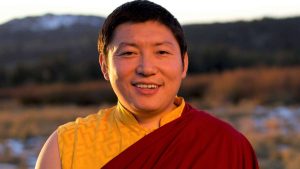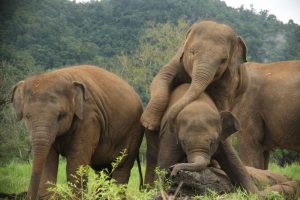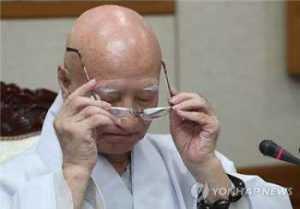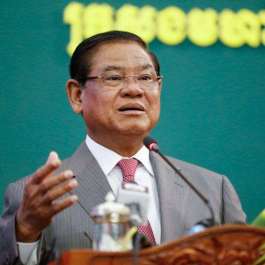
The revered Korean Dharma master and socially engaged Buddhist activist Venerable Pomnyun Sunim (법륜스님) returned in early September to Bhutan, where he has been conducting a wide range of community surveys and social development activities among remote communities, aiming to improve the quality of daily life and explore sustainable development projects that could serve as models to be replicated around the world.* During his latest visit, Ven. Pomnyun Sunim held a three-day workshop on sustainable development for rural communities in central Bhutan.
Ven. Pomnyun Sunim’s undertakings in Bhutan are being implemented by the Buddhist humanitarian relief organization JTS Korea in cooperation with the royal family and the Royal Government of Bhutan. Ven. Pomnyun Sunim established Join Together Society (JTS) as an expression of the compassion of engaged Buddhism, and based on the principle that helping others is the best way to enrich one’s own life. Charged with bringing hope, empowerment, and self-reliance to underprivileged communities in developing countries, JTS is operated and manned by unpaid volunteers, who carry out relief work in countries suffering from humanitarian disasters. JTS has engaged in humanitarian projects in Bangladesh, Cambodia, Laos, Myanmar, the Philippines, and Sri Lanka. The relief organization has also earned Special Consultative Status to the United Nations Economic and Social Council (ECOSOC).
After several days of almost non-stop international and domestic travel, Ven. Pomnyun Sunim arrived in central Bhutan, where he was to lead the three-day seminar. Attended by civic leaders from five gewog** villages in Zhemgang and Trongsa districts, the gathering was aimed at providing a forum to propose and explore pilot projects for sustainable development in their communities. The workshop was attended by 34 central government officials, gewog leaders, and village leaders from Korphu Gewog in Trongsa District, and Bardo, Goshing, Phangkhar, and Nangla Gewogs in Zhemgang District.
For the first day of the conclave, Ven. Pomnyun Sunim began with a presentation about the need for sustainable development and an examination of pilot project cases in Bhutan.
“For the next three days, our topic of discussion will be: how can we make our villages more satisfying places for residents to live?” Ven. Pomnyun Sunim said in his opening address. “First, let’s look at the case of South Korea. Over the past 100 years of modern history, South Korea has experienced the failure of a corrupt monarchy, foreign interference, Japanese colonial rule, and the Korean War, which comprehensively devastated the country. In 1960, South Korea’s per-capita GDP was just US$100, making it one of the poorest countries in the world. How could a country with no natural resources achieve such rapid growth from such difficult circumstances? I’d like to share that story with you.” (Jungto Society)
He went on to emphasize by example how South Korea’s rapid economic recovery and growth was not solely a result of government policies, noting the crucial role played by traditional community spirit in Korea.
“First, Koreans have always placed great importance on their children’s education. Even during wartime, all schools remained operational. The educational civil servants who became teachers were exceptionally diligent, as most of them were top students themselves,” Ven. Pomnyun Sunim explained. “Second, the government developed and implemented effective economic development policies. Third, there was another inner factor that outsiders often overlook: Koreans have a strong sense of community, embodied in the phrase, ‘We take care of our own village. . . .’ As a result, even during Japanese colonial rule, educated people would return to their hometowns during school breaks to teach children who couldn’t attend school. This became a cultural norm. In the 1960s, when I was in school, college students would spend about three weeks of their vacation doing “rural service activities,” helping with farm work or volunteering in factories. There was a strong belief that those who had received an education should share their benefits with those who had not. This led to a national movement called “Saemaul Undong,” the New Village Movement, based on the idea, ’We develop our village ourselves. . . .’
“Zhemgang has one of the highest poverty rates in Bhutan, and despite years of effort by the Bhutanese government, the problem remains unsolved. I believe this issue can’t be resolved through government development policies alone, but it’s possible when residents take the initiative themselves. With the mindset of ‘Let’s change our village ourselves,’ if residents work together for a few years, they can bring about change. When residents have this awareness and cooperate with JTS, they can fundamentally escape poverty.
“However, currently in Bhutan, anyone who has received even a little education is leaving for foreign countries such as Australia to earn money. This makes it difficult for Bhutan to prosper. Talented individuals need to realize that their talents belong not just to themselves, but to the entire nation. These talents should be used to improve the lives of all citizens. The atmosphere needs to change in this direction for the country to develop as a whole. If talented individuals continue to use their abilities solely for personal gain, national development becomes extremely challenging. . . .” (Jungto Society)
Ven. Pomnyun Sunim continued in the afternoon with a presentation that focused on ““Sustainable Development in the Age of Climate Crisis.” There he underscored the importance of pursuing environmental preservation and sustainable development simultaneously.
“Whether it happens 50 years from now or 100 years from now, a time will come when it will be difficult for people to live due to the climate crisis,” he observed. “I hope you will participate in this project with the idea of showing the world that Bhutan has a model for life that can overcome this climate crisis—a life in which people can be happy while consuming less. . . .”
“First, for sustainable development, we must develop minimally within the limits of preserving the Earth’s environment. This is how our descendants can continue to live for a long time. . . . Second, to achieve sustainable development, we must help people become self-reliant. When we provide assistance, their lives are maintained, but if that help is cut off and they can no longer sustain themselves, it means they haven’t achieved individual self-reliance, which is not sustainable. . . . Third, it’s about when people are happy. People feel satisfied when they get what they want. . . . However, not everything we want actually comes true. In fact, more often than not, things don’t work out. That’s when we feel bad. In other words, when our desires are fulfilled, we feel good, and when they’re not, we feel bad. This constant cycle of happiness and unhappiness is what the Buddha referred to as samsara. It means the cyclical repetition of suffering and pleasure.” (Jungto Society)
Ven. Pomnyun Sunim continued: “When almost nothing we want is achieved and unhappiness reaches its peak, we call it hell. When many of our desires are fulfilled and happiness reaches its peak, we call it heaven. People don’t want to go to hell and wish to go to heaven, but in reality, our lives cycle between these extremes. This is called samsara. What the Buddha referred to as nirvana is escaping this cycle. If we seek joy by satisfying our desires when they arise, we inevitably experience suffering when those desires are not met. The Buddha taught us to simply be aware of our desires as they are. Instead of thinking, “My desire must be fulfilled,” we should recognize: “Ah, desire is arising.” By becoming free from these desires through awareness, we can escape suffering and achieve true happiness.” (Jungto Society)
Attendees then gave case presentations on their experiences with the successes of and challenges faced by existing pilot projects conducted in Korphu Gewog, Nabji Chiwog, and Nimshong Chiwog to repair irrigation canals and roads, and improve housing.
“Through this pilot project, residents experienced how good it is to help each other, and they moved away from the idea that simply leaving it to construction workers is the best approach,” they added. (Jungto Society)
During the second day of the seminar, the participants examined sustainable development from a more in-depth perspective.
“JTS’s sustainable development efforts in Bhutan involve two overlapping activities: first, there are initiatives to improve the lives of people in difficult circumstances; second, there are activities aimed at ensuring environmentally sustainable development without reckless exploitation driven by human desires in this era of climate crisis. Therefore, if you think of JTS’s work here only as relief activities for the needy, contradictions may arise,” Ven. Pomnyun Sunim remarked. (Jungto Society)
Sunim identified seven key target areas for sustainable development: improving living conditions (including improving substandard dwellings and building houses for people without homes); improving productivity (such as irrigation systems, farm roads, and sustainable livelihoods); improving schools and educational facilities; improving access to healthcare and medical treatment; improving community infrastructure; preserving traditional culture; and protecting the natural environment.
This was followed by group discussions, during which the participants explored the kinds of initiatives they would prioritize for their villages, and drafted implementation plans and village workforce management proposals. Various strategies for the immediate term—to be completed by May 2025—and the medium term—to be completed across a three-year timeframe—were then presented for discussion, consideration, and refinement.
“If all the current pilot projects succeed, this project will expand to all of Zhemgang District in the future,” Ven. Pomnyun Sunim noted. “The success of the sample projects is necessary for the main project to proceed, and the success of the main project is essential for it to spread throughout Bhutan. The central government is also very interested in the results of the pilot projects. Since many people are watching with interest, let’s all work together to successfully carry out the pilot projects. Thank you all for your hard work.” (Jungto Society)
On the workshop’s third and final day, Ven. Pomnyun Sunim thanked the participants for their input over the course of the previous day, emphasizing: “Since the participation of community residents is the most important aspect of sustainable development, please focus on only those projects in the pilot program where residents have expressed their willingness to participate.”
After detailed discussions of feasibility and prioritizing a range of initiatives, ranging from irrigation systems and school improvements to rebuilding homes, increasing access to potable water, and road surfacing, the participants shared their reflections on the three-day gathering:
“I felt that projects carried out by the UN and the Asian Development Bank are fundamentally different from those carried out by JTS. Other organizations just provide support and end there, but with JTS, the villagers all participate together and create it together.
“I have a sense that the community is coming back to life. I’m so grateful to Sunim, and I will show my gratitude through the results of this project.
“JTS’s principles really are amazing. Until now, we had a strong mindset of just waiting for the government to do things for us. Now, we will change our mindset; instead of waiting, we will make our villages beautiful ourselves.” (Jungto Society)
“There is a Korean saying, ‘Sincerity moves heaven,’” Ven. Pomnyun Sunim said in his concluding remarks. “It means that if you put your heart and soul into something, even the gods will be moved and everything will be accomplished. If you move forward with faith in rebuilding your villages and your country, without too much hesitation or fear, everything will naturally fall into place. . . .
“Yet, while it’s important for us to achieve results, what’s truly crucial is awakening the community spirit where villagers voluntarily take on the work of their village. When people face despair and frustration, they often turn to drinking or gambling. But when we drink a little or sing songs while working like this, it becomes a source of energy. This can be considered healthy play. I think it’s good to dance and sing not only during festivals, but also to share joy after completing tasks like building irrigation canals or paving roads.” (Jungto Society)
In the days following the conclusion of the seminar, Ven. Pomnyun Sunim gave a lecture at the Royal Thimphu College, and held meetings to discuss cooperation and collaboration with officials from the Bhutan Tourism Council, the Ministry of Agriculture, and the Tarayana Foundation, which carries out poverty-eradication projects in rural areas. Before leaving Bhutan, he met with a cabinet minister to discuss the outcomes of the workshop, the feasibility of some planned initiatives, the participation of the Bhutanese government, a proposal for regular health clinics for remote communities, and plans for Sunim’s future visits to oversee the pilot projects as they are rolled out in the months ahead.
“From a development-centered perspective, the least developed countries are defined as underdeveloped. However, from an environmental value perspective, the undeveloped states have the highest environmental value,” Sunim told the students at the Royal Thimphu College. “Therefore, instead of following in the footsteps of developed countries, why don’t we find a new path that preserves environmental values and leads humanity?
“This is why I came to Bhutan. I’m trying to create a model for sustainable human life in the climate-crisis era by going to Zhemgang, the most underdeveloped region of Bhutan. If you’re interested, I’d like to work with you to establish the GNH (Gross National Happiness) concept that preserves Bhutan’s values in our human society. It might seem like a ‘useless effort’ now, but as the climate crisis worsens the model we create could become a new hope for humanity.” (Jungto Society)
Ven. Pomnyun Sunim is a widely revered Korean Dharma teacher, author, and social activist. He has founded numerous organizations, initiatives, and projects across the world, among them: JTS Korea, an international humanitarian relief organization working to eradicate poverty and hunger; Jungto Society, a volunteer-based community founded on the Buddha’s teachings and dedicated to addressing modern social issues that lead to suffering; Ecobuddha, an organization focused on environmental ethics and sustainable living based on the teachings of the Buddha; and Good Friends, which promotes reconciliation and cooperation between the North and South Korea, and provides humanitarian aid to North Koreans. Ven. Pomnyun Sunim also works closely with the International Network of Engaged Buddhists (INEB).
In October 2020, the Niwano Peace Foundation in Japan presented the 37th Niwano Peace Prize to Ven. Pomnyun Sunim in recognition of his international humanitarian work, intensive environmental and social activism, and his tireless efforts to build trust and goodwill between communities of different faiths and cultures, toward the goal of world peace.**

* Engaged Buddhism Special Report: Ven. Pomnyun Sunim Explores Sustainable Development in Bhutan (BDG)
** A gewog or village block is a geographic administrative unit formed a grouping of villages.
*** Buddhist Monk Ven. Pomnyun Sunim Awarded the 37th Niwano Peace Prize (BDG)
See more
Pomnyun
Jungto Society
JTS Korea
JTS America
International Network of Engaged Buddhists (INEB)
Why Do We Live a Life of Repeating Pleasure and Suffering? (Jungto Society)
How Can We Achieve Sustainable Development? (Jungto Society)
How Can We Live Happily While Consuming Less? (Jungto Society)
My Economic Income Is Unstable, So My Mind Is Always Anxious (Jungto Society)
Related news reports from BDG
Engaged Buddhism: Ven. Pomnyun Sunim and JTS Volunteers Review Progress of Post-Earthquake School Project in Türkiye
Engaged Buddhism: Ven. Pomnyun Sunim Inaugurates Remodeled Orphanage in Thailand
Engaged Buddhism: JTS Korea Brings Humanitarian Relief to Sri Lankans Hit by Economic Crisis
Engaged Buddhism Special Report: Ven. Pomnyun Sunim and JTS Conduct Emergency Relief in Assam after Severe Floods
Engaged Buddhism Special Report: Ven. Pomnyun Sunim Inaugurates Female Dormitory for Buddhist University in Cambodia
Special Report: Ven. Pomnyun Sunim Leads 10,000 People in Great Dharma Assembly for Peace on the Korean Peninsula
Related features from BDG
Footsteps of the Buddha: Ven. Pomnyun Sunim and the Transformative Power of Engaged Buddhism
Sujata Academy: The Power of Hope and Compassion in India
Related columns from BDG
Dharma Q+A With Ven. Pomnyun Sunim
Related videos from BDG
Dharma Q+A with Ven. Pomnyun Sunim
Wisdom Notes from Ven. Pomnyun Sunim
































